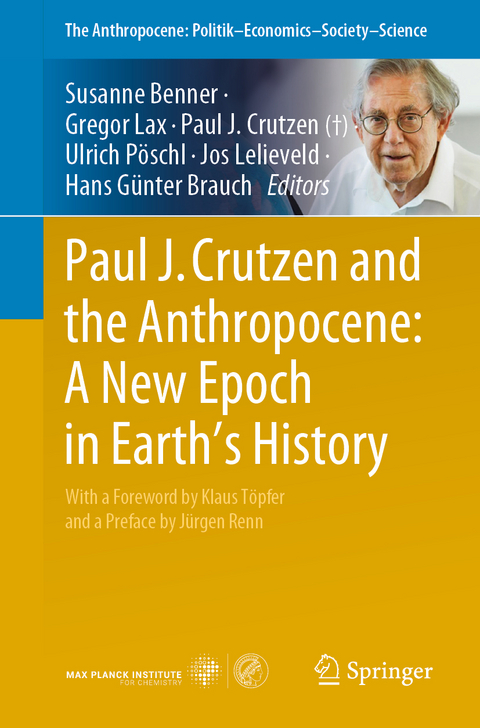
Paul J. Crutzen and the Anthropocene: A New Epoch in Earth’s History
Springer International Publishing (Verlag)
978-3-030-82201-9 (ISBN)
The main text consists primarily of articles from peer-reviewed scientific journals and other scholarly sources. It comprises selected articles on the Anthropocene published by Paul J. Crutzen and a selection of related articles, mostly but not exclusively by colleagues with whom he collaborated closely.
-In the year 2000 Nobel Laureate Paul J. Crutzen proposed the Anthropocene concept as a new epoch in Earth's history -Comprehensive collection of articles on the Anthropocene by Paul J. Crutzen and his colleagues-Unique primary research literature and Crutzen's comprehensive bibliography-Paul Crutzen's scientific investigations into human influences on atmospheric chemistry and physics, the climate and the Earth system, leading to the conception of the Anthropocene-Reflections on the Anthropocene and its implications-Bibliometric review of the spread of the use of the Anthropocene concept in the Natural and Social Sciences, Humanities and Law
Dr. Susanne Benner is head of communications at the Max Planck Institute for Chemistry in Mainz since 2011. She studied biology at the RWTH Aachen University in Germany and obtained a Ph.D. time in organic chemistry at the Swiss Federal University Zurich (ETHZ).
Dr. Gregor Lax is a research scholar at the Max Planck Institute for the History of Science in Berlin. With a PhD from University of Bielefeld (2014), he worked at the Max-Planck-Institute for Chemistry and for the German Council for Science and Humanities (Wissenschaftsrat).
Prof. Dr. Paul J. Crutzen ( ) was a director at the Max Planck Institute for Chemistry in Mainz. He received the Nobel Prize in Chemistry in 1995 for his work on ozone depletion. He addressed the Nuclear Winter in the 1980s and coined the Anthropocene concept in 2000.
Prof. Dr. Ulrich Pöschl is director of the Multiphase Chemistry Department at the Max Planck Institute for Chemistry and professor at the Johannes Gutenberg University in Mainz. He studied chemistry at the TU of Graz, Austria, and he worked at the Massachusetts Institute of Technology, at the Max Planck Institute for Chemistry, and at the TU of Munich.
Prof. Dr. Jos Lelieveld studied natural sciences Leiden Univ. (1984), obtained a PhD in Physics and Astronomy Utrecht Univ. (1990), was Prof. of Atmospheric Physics and Chemistry Univ. of Wageningen and Utrecht (1993-2000). Since 2000 he is Director and Scientific Member at the Max Planck Institute for Chemistry and Professor in Atmospheric Physics, University of Mainz.
PD Dr. Hans Günter Brauch taught as an Adj. Prof. international relations at the Free University of Berlin, he has been chairman of Peace Research and European Security Studies (AFES-PRESS) since 1987 and of the board of the HGB Foundation on Peace and ecology in the Anthropocene (HGBS) since 2000 and editor of five book series with Springer Nature.
1.Paul J. Crutzen: From Anthropogenic Influences to the Anthropocene.- 2. The 'Anthropocene' (2000).- 3. Geology of Mankind (2002).- 4. The 'Anthropocene' (2002). 5. Atmospheric Chemistry in the 'Anthropocene'(2002).- 6 How Long Have We Been in the Anthropocene Era? (2003).- 7. Atmospheric Chemistry and Climate in the Anthropo-cene - Where Are We Heading? (2004).- 8. Earth System Dynamics in the Anthropocene (2004).- 9. The Anthropocene: Are Humans Now Overwhelming the Great Forces of Nature? (2007).- 10. Atmospheric Chemistry and Climate in the Anthropocene (2007).- 11 Fate of Mountain Glaciers in the Anthropocene (2011).- 12 Living in the Anthropocene: Toward a New Global Ethos (2011).- 13 The Anthropocene: From Global Change to Planetary Stewardship (2011).- 14 Atmospheric Chemistry and Climate in the Anthropo-cene (2012).- 15 Climate, Atmospheric Chemistry and Biogenic Proces-ses in the Anthropocene (2012).- 16The Palaeoanthropocene - The Beginnings of Anthro-pogenic Environmental Change (2013).- 17 Stratigraphic and Earth System Approaches to Defining the Anthropocene (2016).- 18 Was Breaking the Taboo on Research on Climate Engineering via Albedo Modification a Moral Hazard or a Moral Imperative? (2016/2017).- 19 Declaration of the Health of People, Health of Planet and Our Responsibility Climate Change, Air Pollution and Health Workshop (2017).- 20 Transition to a Safe Anthropocene (2017).- 21 The Anthropocene - Reflections (2018).- 22 The Anthropocene Concept in the Natural and Social Sciences, the Humanities and Law - A Bibliometric Analysis and a Qualitative Interpretation (2000-2020).
| Erscheinungsdatum | 11.12.2021 |
|---|---|
| Reihe/Serie | The Anthropocene: Politik—Economics—Society—Science |
| Zusatzinfo | XLV, 595 p. 124 illus., 106 illus. in color. |
| Verlagsort | Cham |
| Sprache | englisch |
| Maße | 155 x 235 mm |
| Gewicht | 973 g |
| Themenwelt | Studium ► Querschnittsbereiche ► Prävention / Gesundheitsförderung |
| Naturwissenschaften ► Biologie ► Ökologie / Naturschutz | |
| Naturwissenschaften ► Geowissenschaften ► Geologie | |
| Naturwissenschaften ► Geowissenschaften ► Mineralogie / Paläontologie | |
| Schlagworte | atmospheric chemistry • Conception of the Anthropocene • Global Environmental Change • Implications of the Anthropocene • Paul Crutzen |
| ISBN-10 | 3-030-82201-X / 303082201X |
| ISBN-13 | 978-3-030-82201-9 / 9783030822019 |
| Zustand | Neuware |
| Haben Sie eine Frage zum Produkt? |
aus dem Bereich


